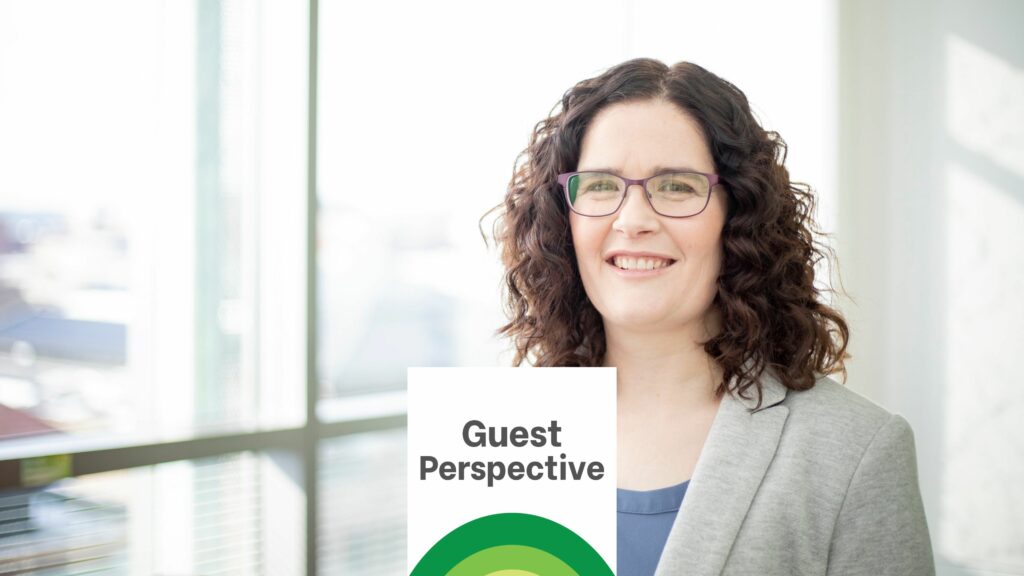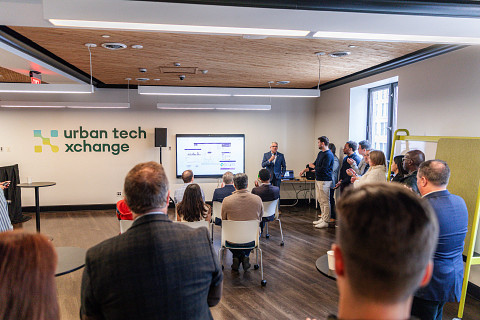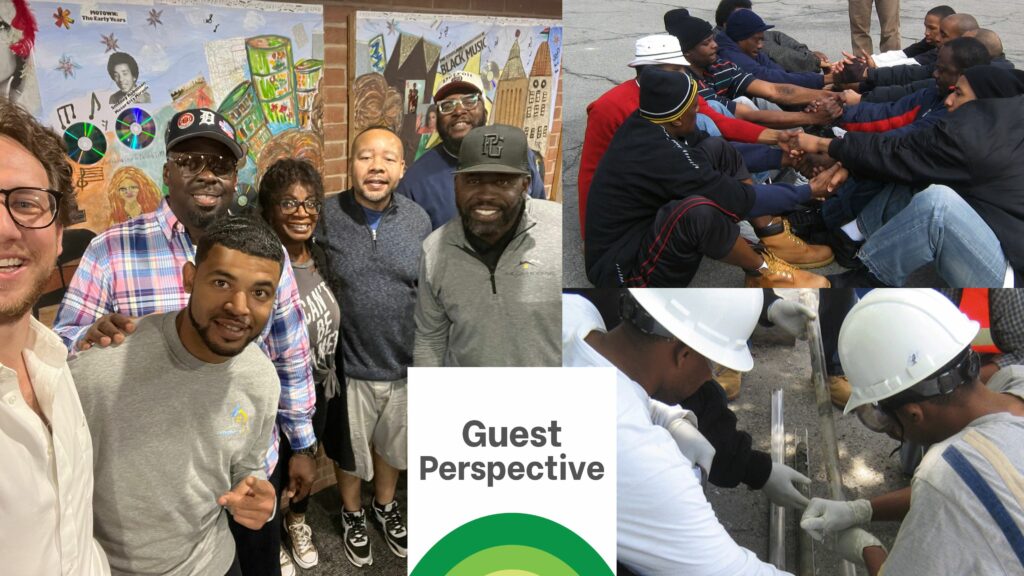Moving Toward a More Just and Sustainable Future in Southeast Michigan

Sara Soderstrom is an associate professor in Organizational Studies and Program in the Environment and the Erb Undergraduate Fellows faculty director at the University of Michigan. Sustainability has evolved significantly over the years. At the University of Michigan’s Erb Institute for Sustainability in Business, this evolution includes working toward market transformation: business transforming the market to make it more sustainable. We can’t be thinking only: ‘How do we do less bad? How do we pollute less? How do we use fewer resources?’ We need to actually think about ‘How do we do more good?’ That fundamentally pivots the way that you think about business—it’s much more of a proactive than reactive conversation. It also centers justice in a way that early business sustainability didn’t. This shift changes the local vs. global dynamic to consider the local as part of the global system, and it sharpens the focus on small and midsize businesses. It also considers supply chains and key stakeholders more broadly. A study that I conducted with Kathryn Heinze, associate professor in the School of Kinesiology at the University of Michigan, shows some of the ways these shifts are happening. The study focused on the nonprofit FoodLab, which was operating in Detroit at the time. FoodLab aimed to promote healthy, environmentally sustainable, and accessible food systems and to grow a good food economy by working with its members: local food entrepreneurs. One thing that we realized as we were working with local entrepreneurs was a focus on being embedded in place—what is Detroit? What is the commitment to the city? What is the future for the city we envision? And how do we place ourselves in that future as entrepreneurs? With this network of businesses, there was a strong motivation not just for the financial viability of the business, but for doing good through business. But at the same time, these entrepreneurs have resource constraints, so there are tradeoffs. How do you balance things like a living wage with ensuring composting or locally sourced materials? FoodLab helped ease some of these constraints by serving as a connector that lowered the barriers to entry around sustainability. This way, each entrepreneur didn’t need to have all the answers or all the resources—they could get the information they needed about sourcing, financing, or best practices through the network. FoodLab functioned as part incubator, part social movement organization, connecting folks with these shared interests to collectively learn, but also as the space that could aggregate these resources and make them accessible to people, so that they could more effectively move forward towards sustainability and justice goals. FoodLab asserted that they couldn’t have a just and sustainable food economy if there wasn’t engagement, ownership, and voice from diverse entrepreneurs that reflect the City of Detroit. So they had a lot of intentionality around diversity and engagement, both in who was participating as entrepreneurs in the network, but also in what they were prioritizing as their goals as an organization. It was centering equity and justice in almost every conversation and decision they were having. The ways that FoodLab built its organizational practices and structured conversations made sure that everyone involved felt like they were heard, even in contentious conversations, which built trust and helped them move collectively towards this more just and sustainable imagined future. The Erb Institute – a partnership of the Ross School of Business and the School for Environment and Sustainability at the University of Michigan -. works to create a sustainable world through the power of business. Somewhat like FoodLab, we also serve as an enabling network. The students are the key actors, We are the convener, and then the network continues with alumni who are now 10 to 20 years out but still lean into us and each other for support as they work toward solutions to sustainability and justice challenges. Two of our key programs are: Impact Projects, through which students design projects, often working directly with businesses or partnering with businesses and community partners on organization-led projects. The projects give businesses access to students who have time, expertise, and passion around sustainability and justice efforts, who can help them focus on an issue—such as supply chain, procurement, or skills redevelopment. Erb on the Road, which brings both graduate and undergraduate students to businesses, nonprofits, and other organizations across Michigan. The program allows students to engage with a variety of different types of businesses and nonprofits that are focused on local sustainability challenges and figure out solutions for them. For undergrads specifically, what has been powerful is hearing them reflect on learning what is happening locally—which makes what we talked about in the textbook real—but their experiences are helping them recognize that business and sustainability is an available career path. People are committed to sustainability in myriad ways, and you don’t need to wait until you are chief sustainability officer to do sustainability. The Erb Institute is focused on preparing future leaders – and also service to the state of Michigan. We want students to recognize that being part of the University of Michigan isn’t just the Ann Arbor campus – it’s also the state and world. So we work to help focus that commitment to: What does it really mean to be the leaders and the best? Supporting and engaging locally in Detroit and across Michigan is part of that. Be sure to subscribe to our newsletter for regular updates on sustainable business practices in and around Detroit.
NextEnergy: Working Toward Smarter, Cleaner, and Accessible Solutions for Communities and Cities

According to The World Economic Forum, the share of the world’s population living in cities is expected to rise to 80% by 2050, from 55% now. This increased density combined with an aging infrastructure, a growing digital divide, and other variables brings significant challenges in terms of supporting this increase in density. To address these challenges, NextEnergy works collaboratively to accelerate commercialization in mobility and energy efficiency. SBND interviewed Jim Saber, NextEnergy president and CEO, about its work. Q: Tell me about NextEnergy A: NextEnergy is a nonprofit corporation with a mission to accelerate smarter, cleaner, and more accessible solutions for communities and cities. We partner with innovators to facilitate the commercialization, testing, and deployment of technology in the energy and mobility spaces. We also work with the public sector to help educate on how these solutions can improve the quality of life for people who live, work, and visit their communities. Q: What is the impetus behind NextEnergy? A: Our focus has always been on creating and accelerating new use cases (how a product or service could be used), new applications, and new sectors for the state of Michigan. We were established in 2002 with funding from the Michigan Economic Development Corp. Our goals have remained consistent: To create new opportunities for Michigan to design, develop, and produce new solutions in energy and mobility. Q: Your services include project and program development, market business and trend research, consortium building, infrastructure assessment and design, and custom energy analysis. What are some examples of projects you are working on within these services? A: When it comes to project and program development, NextEnergy partners with Michigan-based companies from startups to Tier 1 automotive suppliers, and energy providers to develop collaborative programs to allow technology to move forward. We are also heavily involved in securing funds from the U.S. Departments of Commerce, Energy, and Transportation among others to bring new solutions to the market. Most recently we’ve been called on to manage two facilities on behalf of industries. These are the Detroit Smart Parking Lab (DSPL) and the Urban Tech Xchange (UTX). These facilities are set up to partner with industry innovators to test and demo new solutions in real-world environments. The DSPL is used to develop solutions for automated parking, charging, sensing applications, and more, to provide data to developers and city planners on how to manage spaces. This is a consortium between Bosch, Ford, Bedrock Detroit, and the Michigan Office of Future Mobility and Electrification. The Urban Tech Xchange operates in the same way, with a focus on the built environment. This is a consortium between Bosch, Bedrock Detroit, KODE Labs, and Cisco. On the market business and the research side, we help companies understand how their solutions best fit the market, assist with the best ways to go to market, who to partner with, how to work with the public sector, and more. When it comes to consortium building, an example of a project we are working on is the development and testing of components that allow for fast fueling of Class 8 trucks (33,001+ pounds), using hydrogen. Within the areas we focus on – mobility and energy – all of the new applications require additions and modifications to existing buildings and property infrastructure. Our team works with companies, cities, and communities to assess where solutions are best deployed, determine how to make them more cost-effective, and understand how best to design and execute, and how to bring it all together. Q: In what ways do you think NextEnergy is making a difference in Southeast Michigan when it comes to sustainability? A: Many of the companies we work with are in Southeast Michigan. I think the work we do to help these businesses bring new solutions and opportunities to market helps them to become more sustainable and employ more people. Outside of Southeast Michigan, we are working with MiNextCities to help create resilient communities in Dearborn, Marquette, and Flint. Q: Tell me about the work you are doing in Dearborn. A: The goal here is to improve community health and minimize the impacts of natural occurrences in the city. We have worked with the city on two areas: The first is planning and preparation to restore city services and mitigate losses from flooding as a result of storms. We’ve been able to partner with the city and companies to install technology that involves real-time sensing and AI monitoring of rising water within the stormwater system. This helps draw comparisons from past events to predict and then mitigate the impacts of flooding, saving the city and residents money, and minimizing health and energy impacts. The second focus in Dearborn has been on air quality. We partnered with Just Air – a startup in Detroit – that takes air quality measurements and brings them into a dashboard in a user-friendly way so that residents can get real-time information on air quality and determine if they should stay inside, etc. Q: In what other ways do you work on and impact sustainability? A: Part of our mission is to move forward solutions at the micro and macro levels that allow us to use less energy. Simply put, the most valuable kilowatt hour of energy is the one you don’t have to use. Creating new mobility applications and solutions for how we move people and goods is another way. Through the MEDC Office of Future Mobility and Electrification, we have been able to support innovators with local Michigan partners (investors, businesses, and communities) to deploy new mobility technology in the state. We have deployed tech in over 30 Michigan communities such as EV charging stations, automated vehicles, and applications that make mobility more accessible. We are affiliated with Michigan Clean Cities (MICC), which is part of a national network of Clean Cities Coalitions supported by the federal government. Its mission is to reduce dependence on fossil fuels for transportation and its work focuses on education, outreach, and community engagement. One of the newer
Detroiters Working for Environmental Justice’s Vision for Sustainability

LAPRISHA BERRY DANIELS IS EXECUTIVE DIRECTOR OF DETROITERS WORKING FOR ENVIRONMENTAL JUSTICE AND A LEADERSHIP COMMITTEE MEMBER FOR SUSTAINABLE BUSINESS NETWORK DETROIT DWEJ’s vision for sustainability is rooted in the three pillars of sustainability: health and happiness of community members, a healthy local environment free from hazards and harm, and economic vitality. As an organization that focuses on environmental justice and strives to have the voice of the community-centered as decisions are being made that impact their health (physical, mental, spiritual, and economic), we assert that community members can envision and create healthy communities that meet their immediate and distal needs. A healthy community is one in which all systems work together to support the health and well-being of all its members. Local businesses are part of the community’s ecosystem and thus play a unique role in supporting the health and well-being of the community. Ideally, the relationship between community members and local business is mutually beneficial as they prioritize health and co-create a healthy community. Local businesses and community members can work together to identify threats to community well-being and create strategies to address challenges. In Detroit, and beyond, climate change threatens our ability to achieve and maintain physical, mental, spiritual, and economic health. As we experience more extreme weather locally, such as extreme heat and annual “100-year floods”, we recognize that our built environment may not be able to weather the storm (pun intended). Unfortunately, our existing residential housing stock and current construction practices are too often ill-suited for current and future climate conditions. The mismatch between what is available and what is needed creates threats to the health of people and planet. DWEJ developed a contractor accelerator program that focuses on contractors increasing their awareness about ways to improve the built environment to mitigate risks related to climate change while centering sustainability. DWEJ’s contractor accelerator program, Building Health, serves as an incubator to support peer-to-peer learning among Detroit-based, Detroit-serving contractors of color. Building Health increases contractors’ awareness and implementation of “environmentally responsible and resource-efficient” practices that have: Bottom-line business benefits Individual and community health benefits Decrease environmental degradation. Building Health increases contractors’ understanding of the impact they can have on health. For example, participating contractors are presented with strategies for upgrading and greening residential housing in ways that include the use of various building methods and materials that can make homes more energy efficient. These improvements decrease greenhouse gas emissions, improve the health and comfort of the home, and improve the economic health of the occupants by reducing the cost of utility use. Participants receive financial and technical assistance to implement practices as part of the program as well. Additionally, contractors learn how to best communicate the benefits of sustainable repair and rehab practices to clients. The role of local contractors is just one example of the opportunity our community has to transform our ecosystem and economy for the better. There is a unique and distinct role that local business plays in supporting people and planet. Sustainability is an iterative process where we must work collectively toward the goal of having healthy and vibrant places in which to live, learn, work, play, and pray. — Check out Laprisha Berry Daniels’s recent #TEDTalks: Lessons from the Past on Adapting to Climate Change Be sure to subscribe to our newsletter for regular updates on sustainable business practices in and around Detroit.


